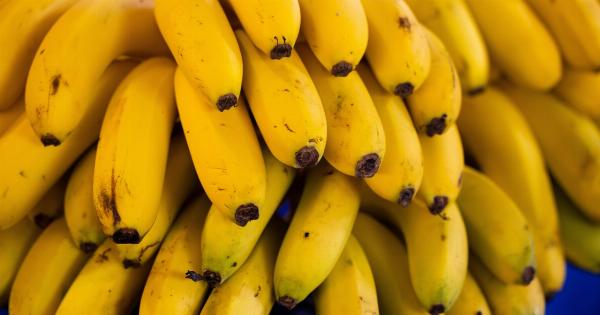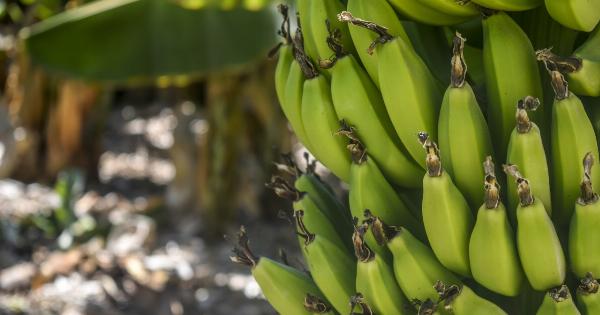Potassium is an essential mineral that plays a vital role in the proper functioning of the body. It helps maintain the electrolyte balance, regulates blood pressure, and supports the proper functioning of nerves and muscles.
Potassium is a nutrient that the body cannot produce by itself and hence it must be obtained through diet. In this article, we will discuss the top 30 best sources of potassium that will help you maintain the right balance of this vital nutrient in the body.
1. Sweet Potatoes
Sweet potatoes are one of the best sources of potassium, offering a whopping 950mg of potassium per 1 medium-sized sweet potato. They are also good sources of fiber, beta carotene, and vitamin C.
They have a low glycemic index which makes them an excellent food choice for people with diabetes.
2. Tomatoes
Tomatoes are another great source of potassium, providing 400mg of potassium per 1 cup. They are also rich in lycopene, an antioxidant that protects the body from cellular damage and inflammation.
Tomatoes are also a good source of vitamin C, vitamin A, and fiber.
3. Bananas
Bananas are one of the most popular sources of potassium. They contain around 400mg of potassium per medium-sized banana. They are also rich in fiber, vitamin C, and vitamin B6.
Bananas are easy to incorporate into the diet, and they are the perfect snack to carry around.
4. Spinach
Spinach is an excellent source of potassium, providing around 560mg of potassium per cup. It is also rich in iron, calcium, vitamin K, and folate.
Spinach is a versatile ingredient that can be eaten raw or cooked, added to salads, smoothies, or stir-fries.
5. White Beans
White beans are an excellent source of potassium, providing 600mg of potassium per cup. They are also rich in fiber, protein, and iron. Studies have shown that eating white beans can help lower cholesterol levels and improve heart health.
White beans can be added to soups, stews, or salads.
6. Avocado
Avocado is another food that is high in potassium, providing around 700mg of potassium per cup. It is also an excellent source of healthy fats, fiber, and vitamin C.
Avocado can be added to salads, smoothies, or used as a substitute for mayonnaise or butter in recipes.
7. Beets
Beets are a great source of potassium, providing 550mg per cup. They are also rich in antioxidants, fiber, and vitamin C. Beets have been shown to aid in digestion, reduce inflammation, and enhance athletic performance.
Beets can be eaten roasted, steamed, or juiced.
8. Yogurt
Yogurt is a delicious source of potassium, providing around 600mg of potassium per cup. It is also rich in calcium, protein, and probiotics. Regular consumption of yogurt has been linked to improved gut health, lower blood pressure, and stronger bones.
9. Brussels Sprouts
Brussels sprouts are a great source of potassium, providing 500mg of potassium per cup. They are also rich in fiber, vitamin C, and vitamin K.
Brussels sprouts have been shown to improve digestion, lower inflammation, and reduce the risk of chronic conditions like heart disease and cancer.
10. Oranges
Oranges are a great source of potassium, providing around 230mg of potassium per orange. They are also rich in vitamin C, folate, and antioxidants. Oranges have been shown to improve immune function, lower blood pressure, and improve skin health.
11. Acorn Squash
Acorn squash is another great source of potassium, providing around 900mg of potassium per cup. It is also an excellent source of vitamin C, vitamin A, and fiber.
Regular consumption of acorn squash has been linked to improved heart health, digestion, and blood sugar control.
12. Cantaloupe
Cantaloupe is a delicious source of potassium, providing around 400mg of potassium per cup. It is also rich in vitamin A, vitamin C, and antioxidants. Cantaloupe has been shown to improve vision, enhance digestive health, and reduce inflammation.
13. Lentils
Lentils are an excellent source of potassium, providing around 370mg of potassium per half cup. They are also rich in fiber, protein, and iron.
Lentils have been shown to help stabilize blood sugar levels, improve digestion, and lower the risk of heart disease.
14. Pomegranate
Pomegranate is a fruit that is high in potassium, providing around 500mg of potassium per cup. It is also rich in antioxidants, vitamin C, and fiber.
Regular consumption of pomegranate has been linked to improved heart health, reduced risk of chronic conditions, and enhanced cognitive function.
15. Almonds
Almonds are a great source of potassium, providing around 200mg of potassium per quarter cup. They are also rich in healthy fats, protein, and fiber.
Regular consumption of almonds has been linked to improved brain function, reduced inflammation, and lower cholesterol levels.
16. Broccoli
Broccoli is a cruciferous vegetable that is high in potassium, providing around 460mg of potassium per cup. It is also rich in vitamin C, vitamin K, and fiber.
Regular consumption of broccoli has been linked to improved immune function, lower inflammation, and reduced risk of cancer.
17. Dates
Dates are a sweet fruit that is high in potassium, providing around 540mg of potassium per cup. They are also rich in fiber, vitamin B6, and antioxidants.
Regular consumption of dates has been shown to improve digestion, enhance bone health, and lower inflammation levels.
18. Milk
Milk is an excellent source of potassium, providing around 400mg of potassium per cup. It is also rich in calcium, protein, and vitamin D.
Regular consumption of milk has been linked to stronger bones, improved heart health, and lower blood pressure levels.
19. Artichokes
Artichokes are a great source of potassium, providing around 470mg of potassium per cup. They are also rich in fiber, antioxidants, and vitamin C.
Regular consumption of artichokes has been linked to improved digestion, reduction in cholesterol levels, and lower risk of chronic conditions.
20. Kiwi Fruit
Kiwi fruit is another delicious source of potassium, providing around 250mg of potassium per kiwi. It is also rich in vitamin C, fiber, and antioxidants.
Regular consumption of kiwi fruit has been linked to improved digestion, enhanced immune function, and improved cardiovascular health.
21. Salmon
Salmon is a fatty fish that is high in potassium, providing around 450mg of potassium per 3 oz serving. It is also rich in omega-3 fatty acids, protein, and vitamin D.
Regular consumption of salmon has been linked to improved brain function, lower inflammation, and improved heart health.
22. Carrots
Carrots are another great source of potassium, providing around 400mg of potassium per cup. They are also rich in beta carotene, fiber, and vitamin K.
Regular consumption of carrots has been linked to improved vision, enhanced digestion, and lower risk of chronic conditions.
23. Figs
Figs are a sweet fruit that is high in potassium, providing around 450mg of potassium per cup. They are also rich in fiber, vitamin B6, and antioxidants.
Regular consumption of figs has been linked to improved digestion, better bone health, and lower blood pressure levels.
24. Mushrooms
Mushrooms are a nutritious food that is high in potassium, providing around 300mg of potassium per cup. They are also rich in B vitamins, fiber, and antioxidants.
Regular consumption of mushrooms has been shown to improve immune function, enhance cognitive function, and lower inflammation levels.
25. Raisins
Raisins are a sweet snack that is high in potassium, providing around 300mg of potassium per half cup. They are also rich in fiber, antioxidants, and iron.
Regular consumption of raisins has been linked to improved digestion, better bone health, and lower inflammation levels.
26. Butternut Squash
Butternut squash is another great source of potassium, providing around 600mg of potassium per cup. It is also an excellent source of vitamin A, fiber, and vitamin C.
Regular consumption of butternut squash has been linked to improved digestion, lower inflammation levels, and improved heart health.
27. Cashews
Cashews are a tasty snack that is high in potassium, providing around 280mg of potassium per quarter cup. They are also rich in healthy fats, protein, and fiber.
Regular consumption of cashews has been shown to improve brain function, reduce inflammation, and lower the risk of chronic conditions.
28. Cucumbers
Cucumbers are a refreshing food that is high in potassium, providing around 250mg of potassium per cup. They are also rich in vitamin K, vitamin C, and fiber.
Regular consumption of cucumbers has been linked to improved hydration, enhanced digestion, and lower inflammation levels.
29. Chicken
Chicken is a lean protein source that is high in potassium, providing around 300mg of potassium per 3 oz serving. It is also rich in protein, iron, and vitamin B6.
Regular consumption of chicken has been linked to improved muscle function, better bone health, and reduced risk of chronic diseases.
30. Watermelon
Watermelon is a sweet fruit that is high in potassium, providing around 170mg of potassium per cup. It is also rich in vitamin A, vitamin C, and antioxidants.
Regular consumption of watermelon has been linked to improved cardiovascular health, lower inflammation, and better hydration levels.
Conclusion
As we can see, there are plenty of delicious and healthy foods that are high in potassium. Incorporating these foods into our diet can help us maintain the right balance of this essential mineral in the body.
Regular consumption of these foods can also provide several health benefits, including improved cardiovascular health, better bone health, and reduced risk of chronic conditions.





























